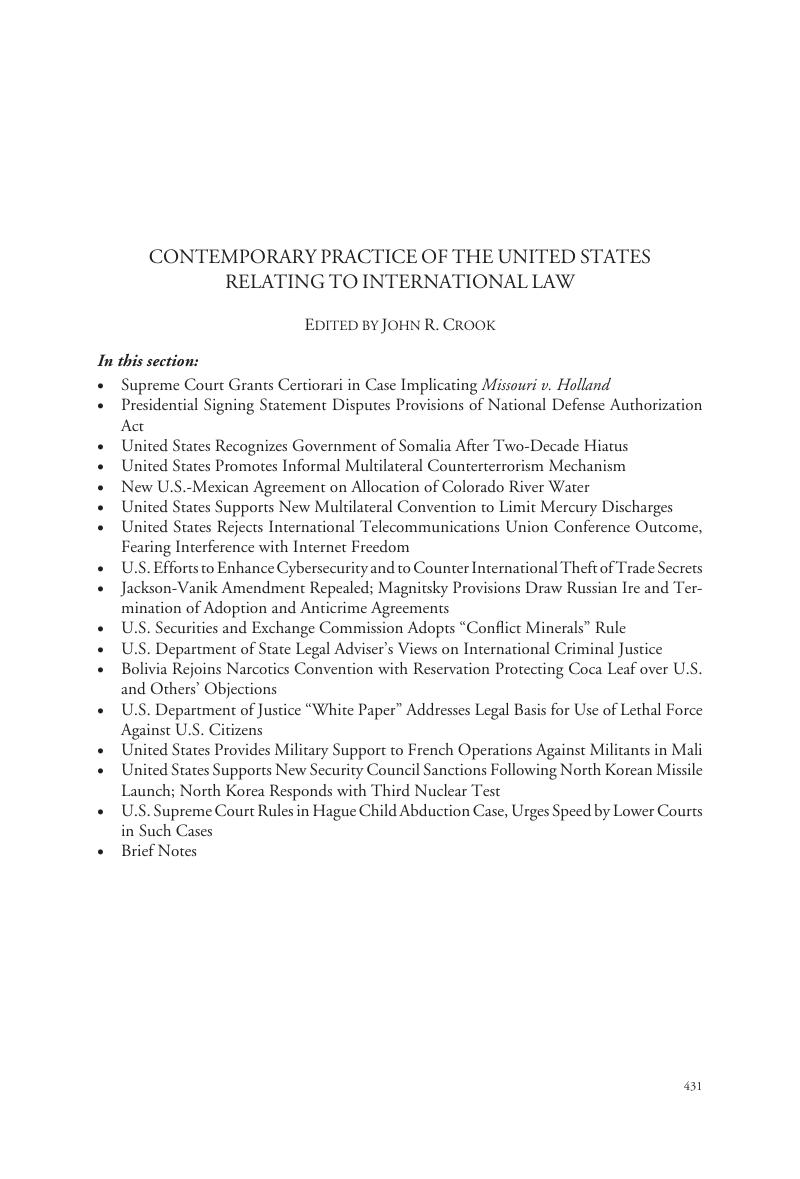Supreme Court Grants Certiorari in Case Implicating Missouri v. Holland
Published online by Cambridge University Press: 20 January 2017

1 Bond v. United States, 133 S.Ct. 978 (2013); see Robert Barnes, Supreme Court to Revisit Case of Spurned Pa. Wife, Wash. Post, Jan. 19, 2013, at A3.
2 Crook, John R., Contemporary Practice of the United States, 105 AJIL 775, 782 (2011)Google Scholar; Ronald J. Bettauer, Supreme Court May Consider How Broadly the “Necessary and Proper” Clause of the Constitution Authorizes Legislation to Implement Treaties, ASIL Insights (Mar. 11, 2013), at http://www.asil.org/pdfs/insights/insight130311.pdf.
3 Missouri v. Holland, 252 U.S. 416 (1920).
5 18 U.S.C. §229 et seq.
6 Convention on the Prohibition of the Development, Production, Stockpiling and Use of Chemical Weapons and on Their Destruction, Jan. 13, 1993, S. Treaty Doc. No. 103-21 (1993), 32 ILM 800 (1993).
7 The Tenth Amendment provides: “The powers not delegated to the United States by the Constitution, nor prohibited by it to the States, are reserved to the States respectively, or to the people.”
8 United States v. Bond, 581 F.3d 128 (3d Cir. 2009).
9 Bond v. United States, 131 S.Ct. 2355 (2011); see Crook, supra note 2, at 782.
10 United States v. Bond, 681 F.3d 149, 158 (3d Cir. 2012).
11 Id. at 161 n.12.
12 Id. at 161.
13 Id. at 151 (quoting Missouri v. Holland, 252 U.S. 416, 432 (1920)).
14 Id.
15 The Bricker Amendment is the name given to a series of constitutional amendments proposed in the 1950s. Their objective was to limit the scope of the treaty power, notably with respect to the Genocide Convention and human rights treaties, which some conservatives saw as a threat to U.S. liberties and institutions, including, for some, the Jim Crow laws. see Whitton, John B. & Fowler, J. Edward, Bricker Amendment—Fallacies and Dangers, 48 AJIL 23 (1954)CrossRefGoogle Scholar; Henkin, Louis, U.S. Ratification of Human Rights Conventions: The Ghost of Senator Bricker, 89 AJIL 341 (1995)CrossRefGoogle Scholar.
16 Bond, 681 F.3d at 165.
17 Id.
18 “Congress passed the Act, which is constitutionally sound legislation, to implement the Convention, a constitutionally sound treaty. Ms. Bond’s appeal generally to federalism, rather than to a workable principle that would limit the federal government’s authority to apply the Act to her, is to no avail.” Id. at 169 (Rendell, J., concurring).
19 Id. at 169–70 (Ambro, J., concurring) (footnote omitted).